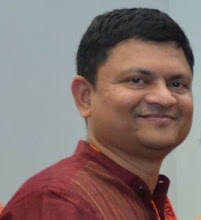Discretion is not the better part of biography.
-Lytton Strachey (1880 - 1932), in Michael Holroyd Lytton, Strachey vol. 1 (1967)
In school we had an English lesson titled "Discretion is the better part of valour." That is a paraphrased version of what Falstaff says in Shakespeare's Henry IV, Part One. Not being the adventurous type, I used to love it. I also fell in love with the above sentence when I saw it a few days back as it catches very well the fact that people present the lives of other people in a rather manipulative way.
Sometimes it is better to have discretion in what you say as in "you should always say the truth, but you do not have to say all the truth." Even in a biography, you may not want to go beyond facts as Laine did in fantasizing who Shivaji's biological father may be.
But if you claim you are presenting a biography then it is best to present all the facts and let the reader/viewer decide about it. When a documentary was made on "Cheaper by the dozen" they made fun of the family without showing the intent of the people. That was bad.
History is written by the victors. So they choose what to tell the public, and more importantly, what not to tell the public. Bhagat Singh was a brilliant person who sported a socialistic attitude and was very widely read in that subject. All you see about it in RDB was his closing a book titled Lenin when the jailor summons him. Of course RDB is not about him or about socialism, so an artistic license there is understandable. But even in text books, it is mentioned in passing and rarely are there teachers with a penchant for history who can tell the middle school students what socialism is and what it meant in pre-independence days when Russia was going strong.
A typical Hindi movie has many temple or mosque scenes. Ever wonder why there aren't any in the Bhagat Singh movies (they did have a couple in the older B&W one). That is because they at least try not to show what he was not. He was an atheist to the end*. He in fact gained his strength from his conviction about it. He fought for the country's freedom because he could not have done otherwise. Unlike some scenes shown, he never had any intention of leaving the jail as he knew his case would take their cause to the masses. The letter he wrote to his father makes that quiet clear. But you don't learn about any of these because "clearly" he was not a "model" son in that sense**. Here is one of my favourite Bhagat Singh quote: "Organised religion is the prop of a man who has not yet found his Self/God within".
Charvak's case is slightly different and hence interesting too. Charvaks are atheists and hence religious establishments were against them and did not let their literature survive***. So, it is the other religions that have saved their arguments against the first religion. Thus all their work is saved by third parties.
All records over long periods are thus a compendium of fact and fabrication. It is many times difficult to make out the difference. The good thing is that often you do not have to care.
* Brief note on Bhagat Singh
** Writings of Bhagat Singh (20 - also 26 for atheism)
*** Charvaks
Take history texts with more than a pinch of salt. Enjoy them, but keep your eyes on the future and learn from the present.
Sunday, September 24, 2006
Subscribe to:
Post Comments (Atom)




No comments:
Post a Comment